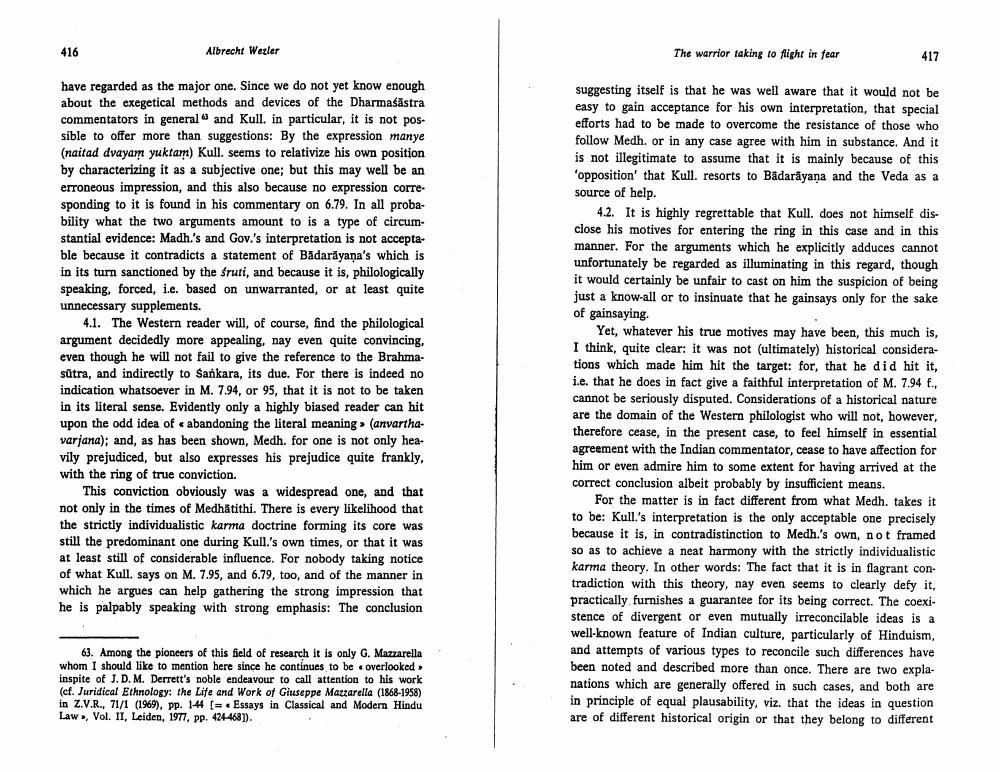________________
416
Albrecht Wezler
The warrior taking to fight in fear
417
have regarded as the major one. Since we do not yet know enough about the exegetical methods and devices of the Dharmaśāstra commentators in general and Kull. in particular, it is not possible to offer more than suggestions: By the expression manye (naitad dvayam yuktar) Kull. seems to relativize his own position by characterizing it as a subjective one; but this may well be an erroneous impression, and this also because no expression corre. sponding to it is found in his commentary on 6.79. In all probability what the two arguments amount to is a type of circumstantial evidence: Madh.'s and Gov.'s interpretation is not acceptable because it contradicts a statement of Badarayana's which is in its turn sanctioned by the fruti, and because it is, philologically speaking, forced, i.e. based on unwarranted, or at least quite unnecessary supplements.
4.1. The Western reader will, of course, find the philological argument decidedly more appealing, nay even quite convincing, even though he will not fail to give the reference to the Brahmasutra, and indirectly to Sankara, its due. For there is indeed no indication whatsoever in M. 7.94, or 95, that it is not to be taken in its literal sense. Evidently only a highly biased reader can hit upon the odd idea of abandoning the literal meaning(anvartha. varjana); and, as has been shown, Medh. for one is not only heavily prejudiced, but also expresses his prejudice quite frankly, with the ring of true conviction.
This conviction obviously was a widespread one, and that not only in the times of Medhatithi. There is every likelihood that the strictly individualistic karma doctrine forming its core was still the predominant one during Kull.'s own times, or that it was at least still of considerable influence. For nobody taking notice of what Kull. says on M. 7.95, and 6.79, too, and of the manner in which he argues can help gathering the strong impression that he is palpably speaking with strong emphasis: The conclusion
suggesting itself is that he was well aware that it would not be easy to gain acceptance for his own interpretation, that special efforts had to be made to overcome the resistance of those who follow Medh. or in any case agree with him in substance. And it is not illegitimate to assume that it is mainly because of this 'opposition' that Kull. resorts to Bådarayana and the Veda as a source of help.
4.2. It is highly regrettable that Kull. does not himself disclose his motives for entering the ring in this case and in this manner. For the arguments which he explicitly adduces cannot unfortunately be regarded as illuminating in this regard, though it would certainly be unfair to cast on him the suspicion of being just a know-all or to insinuate that he gainsays only for the sake of gainsaying.
Yet, whatever his true motives may have been, this much is, I think, quite clear: it was not (ultimately) historical considerations which made him hit the target: for, that he did hit it, i.e. that he does in fact give a faithful interpretation of M. 7.94 f., cannot be seriously disputed. Considerations of a historical nature are the domain of the Western philologist who will not, however, therefore cease, in the present case, to feel himself in essential agreement with the Indian commentator, cease to have affection for him or even admire him to some extent for having arrived at the correct conclusion albeit probably by insufficient means.
For the matter is in fact different from what Medh. takes it to be: Kull.'s interpretation is the only acceptable one precisely because it is, in contradistinction to Medh.'s own, not framed so as to achieve a neat harmony with the strictly individualistic karma theory. In other words: The fact that it is in flagrant contradiction with this theory, nay even seems to clearly defy it, practically furnishes a guarantee for its being correct. The coexistence of divergent or even mutually irreconcilable ideas is a well-known feature of Indian culture, particularly of Hinduism, and attempts of various types to reconcile such differences have been noted and described more than once. There are two explanations which are generally offered in such cases, and both are in principle of equal plausability, viz. that the ideas in question are of different historical origin or that they belong to different
63. Among the pioneers of this field of research it is only G. Mazzarella whom I should like to mention here since he continues to be overlooked inspite of J.D.M. Derrett's noble endeavour to call attention to his work (cf. Juridical Ethnology: the Life and Work of Giuseppe Mazzarella (1868-1958) in Z.V.R., 71/1 (1969), pp. 1-44 [ Essays in Classical and Modern Hindu Law, Vol. II, Leiden, 1977, pp. 424-468]).




